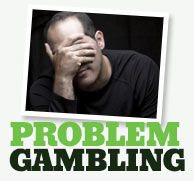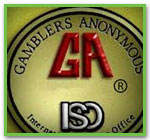
Gambling Addiction: Understanding Problem Gambling
Here at Gambling.net, we're all about having fun with whatever form of gambling you enjoy most. But while the vast majority of our readers will have a great time gambling, it's also true that for some people, gambling stops being fun and starts to become a compulsion. We want our readers to gamble responsibly, so if you think you or someone you know might have a gambling problem, read on to learn more about gambling addiction.
What is a Gambling Addiction?
Gambling addictions can take many forms, but at their heart, they are mental health disorders. Most commonly, when people refer to someone having a gambling addiction, they mean that they are a compulsive gambler – someone who cannot control their desire to gamble, even when they know there will be serious consequences to their gambling or that they can't afford to place a bet.
While compulsive gambling is fairly rare, a more common issue is problem gambling. A problem gambler might not have completely lost control of their gambling, but it is still affecting their life in negative ways. Compulsive gambling likely affects less than 1% of the adult population, but problem gambling could affect 4% or more of adults, with these numbers having risen somewhat as gambling as become more accessible in recent years.
Identifying a Gambling Addiction
 Problem gamblers often mask their behavior to make it more difficult for loved ones to realize the extent of their gambling, while also justifying their behavior to themselves. This means that it may not be obvious when a person has a gambling problem – either to the gambler themselves or those around them.
Problem gamblers often mask their behavior to make it more difficult for loved ones to realize the extent of their gambling, while also justifying their behavior to themselves. This means that it may not be obvious when a person has a gambling problem – either to the gambler themselves or those around them.
That said, there are ways to notice a possible gambling problem. For instance, the American Psychiatric Association set out ten diagnostic criteria for identifying pathological gambling. If an individual shows "persistent and recurrent maladaptive gambling behavior" including five or more of the following:
- The individual is preoccupied with gambling.
- They need to gamble with increasing amounts of money to achieve the desired excitement.
- They need to gamble with increasing amounts of money to achieve the desired excitement.
- They are restless or irritable when attempting to cut down or stop gambling.
- They gamble as a way of escaping from problems or relieving depression or anxiety.
- After losing money gambling, they often try to chase losses to get even.
- They have lied to family, friends, or therapists to conceal the extent of their gambling.
- They have committed crimes to finance their gambling.
- They have jeopardized or lost a relationship, job, or educational opportunity because of gambling.
- They rely on others to provide money to pay off gambling-related debts.
While it takes five of these behaviors to earn a clinical diagnosis, the definition of problem gambling is much looser. However, it's recommended that anyone who has even one or two of these behaviors take a closer look at their gambling activities, just to be sure there isn't a larger problem developing.
Getting Help
While beating a true gambling addiction isn't easy, there are ways to treat compulsive gambling, and lots of resources out there for those looking for help. The best way to treat a gambling problem is through the use of psychotherapy with a trained therapist. This form of counseling has a fairly high success rate, with many gambling addicts overcoming their problems. As an added benefit, a trained professional may be able to identify other underlying problems that contributed to the gambling addiction.
In addition, Gamblers' Anonymous has proven to be an excellent resource for many problem gamblers. While it isn't a substitute for therapy, the ability to speak with others who understand what compulsive gamblers have gone through similar experiences and who are dealing with the same issues with recovery can be a great help to many recovering gambling addicts.
Resources for Gambling Addicts
 The following websites and groups have information that may help those who are dealing with problem gambling (or those who know someone who may have a gambling problem).
The following websites and groups have information that may help those who are dealing with problem gambling (or those who know someone who may have a gambling problem).
Gamblers Anonymous was described above in the getting help section, but it's worth mentioning again. GA is a large organization, but it is actually made up of numerous local organizations that meet regularly to support those that have a desire to stop gambling. Gamblers Anonymous also organizes groups for loved ones and children of problem gamblers.
The National Council on Problem Gambling is an organization based in the USA that advocates on behalf of problem gamblers and their families. Unlike many gambling organizations, it is completely independent of the gaming industry, and is a great place for both unbiased information on problem gambling and information on finding counselors and other treatment programs throughout the United States.
In the UK, gamblers can turn to GamCare, which provides support, information and advice to those suffering from gambling problems. There's also Gamblers Anonymous UK, which is the local branch of the worldwide organization.
Canadians looking for help with problem gambling can turn to provincial resources such as the Problem Gambling Institute of Ontario, which includes information about problem gambling through the country. There are also problem gambling helplines available in every province; a list of these numbers is maintained on this site.
In Australia, gambling is virtually a national pastime – but that also means a relatively high rate of problem gambling. The Australian government operates a problem gambling site with information and resources for individuals throughout the country, including links to many state-specific programs.
